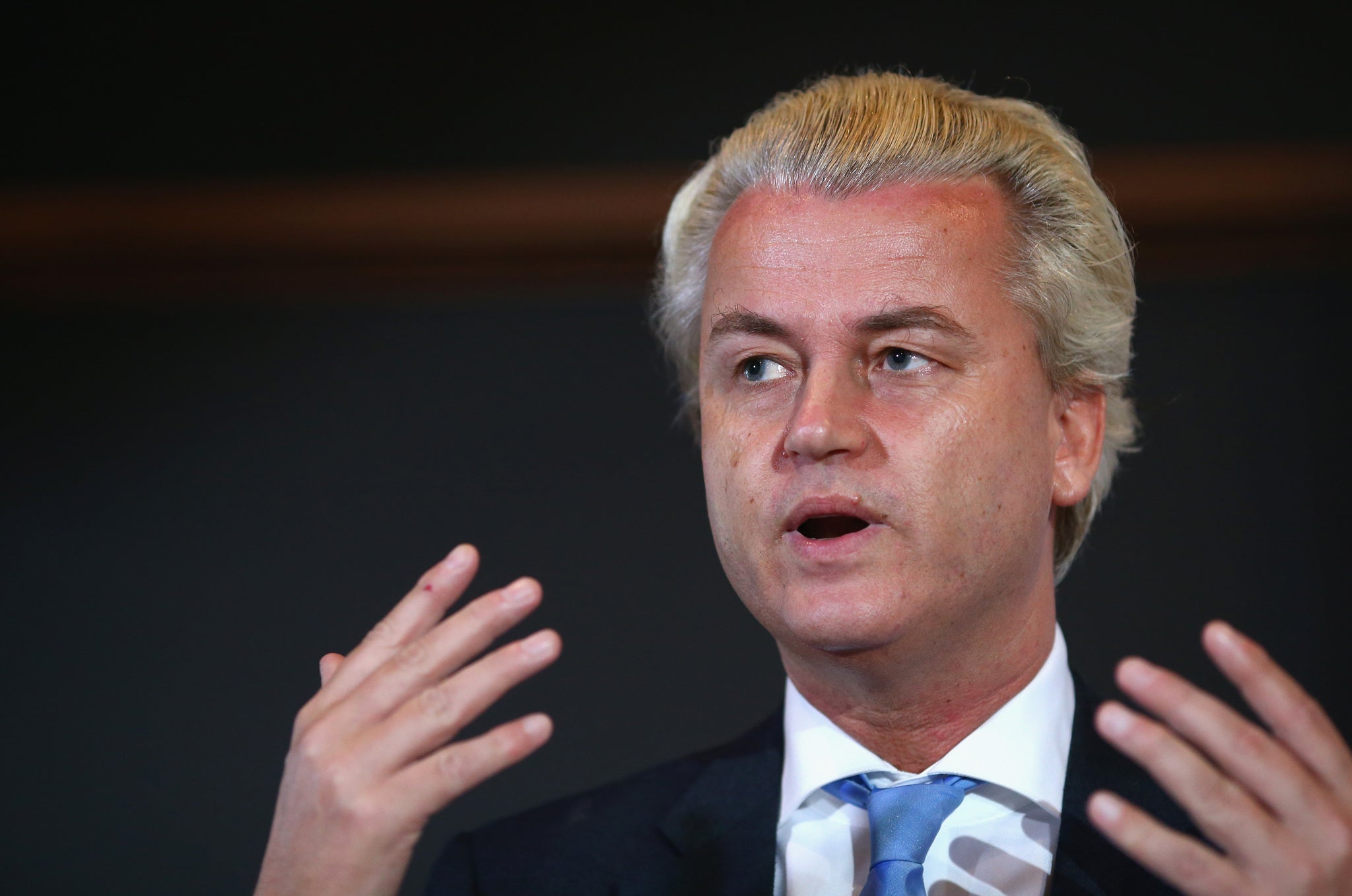You might find Geert Wilders offensive, but there are some very good reasons why he shouldn't be prosecuted
By prosecuting Wilders, it legitimises the 'anti-Establishment' view to those on the far right that free speech is being stifled – which provides them with more power


Your support helps us to tell the story
From reproductive rights to climate change to Big Tech, The Independent is on the ground when the story is developing. Whether it's investigating the financials of Elon Musk's pro-Trump PAC or producing our latest documentary, 'The A Word', which shines a light on the American women fighting for reproductive rights, we know how important it is to parse out the facts from the messaging.
At such a critical moment in US history, we need reporters on the ground. Your donation allows us to keep sending journalists to speak to both sides of the story.
The Independent is trusted by Americans across the entire political spectrum. And unlike many other quality news outlets, we choose not to lock Americans out of our reporting and analysis with paywalls. We believe quality journalism should be available to everyone, paid for by those who can afford it.
Your support makes all the difference.There is nothing a political contrarian likes more than claiming their freedom is being stifled. Donald Trump bangs on incessantly about Hillary Clinton wanting to curtail his right to bear arms. Nigel Farage got all cross-patchy when his grim “Breaking Point” campaign poster was criticised by both sides during the referendum campaign. “That poster reflects the truth of what's going on”, he wailed. It’s all part of the anti-establishment, anti-PC narrative these “outsiders” thrive on.
It must therefore be something like manna from heaven for Geert Wilders, leader of the Dutch Freedom Party (PVV), to find himself on trial for hate speech – especially with a general election in the Netherlands just around the corner. Wilders, whose platinum blond locks have made him the poster boy of Europe’s far-right, boycotted the first day of the court hearing claiming it was a “travesty” and an attack on “freedom of expression”. The views which are the subject of the trial are, he says, shared by “millions of Dutch people” and it is his “duty as a politician to speak about the problems in our country”.
Wilders has made a career out of controversial public remarks. He was acquitted in 2011 of inciting hatred against Muslims but his animus towards Islam has only grown. The PVV’s manifesto ahead of next spring’s parliamentary elections includes pledges to close mosques, prohibit the wearing of religious headscarves and close Dutch borders to migrants from Islamic countries. Wilders has made plain that he believes much of Western Europe is threatened by Islam, suggesting in a recent article for the conservative website Breitbart that the religion is “an existential threat to [the Netherland’s] survival as a free nation”. The solution, he argues, is a process of de-islamisation.
None of these beliefs per se is on trial. Instead, Wilders’ prosecution concerns comments he made at a public meeting in 2014 when he asked supporters in the Hague whether they wanted “fewer or more Moroccans” in their country. As the crowd chanted back “fewer”, Wilders said: “Well, we’ll take care of that.” For prosecutors, the specific references to a group’s nationality (or ethnicity) put the comments in a different category to those Wilders has made about Muslims.
The problem for Wilders’ critics is two-fold: not only do a great many Dutch voters agree with his claims about the problems caused by Moroccan immigrants or young men of Moroccan heritage (everything from vandalism to more serious criminality); many also believe that political correctness has exacerbated those evils. In this analysis, concern about alleged anti-social behaviour by migrants is matched by a hatred of the amorphous “ruling elites”. Just as with Trump in America, or hard line Brexiteers in the UK, or Marine Le Pen in France, this double-whammy is almost impossible to combat – because anybody who opposes attacks against migrants/refugees/Muslims/Mexicans/Moroccans is slammed as an establishment stooge with no interest in the truth.
The hypocrisy in Wilders’ position ought to be clear enough. He proclaims he is the victim of a vicious blow against freedom of expression (whether or not he is ultimately convicted barely matters), yet this is the man who wants to ban a book, the Qur’an, from the Netherlands. Nationalism, however, doesn’t really deal in shades of grey, which is why it is appealing to those with a grievance – it offers an enemy, a choice, a solution.
By contrast, those who believe in the values of the political centre and centre-left – in social justice, in diversity, equality and compassion – have so far failed to conjure a vision of equivalent simplicity or attraction. In the last fifteen years, the West has faced terrorism at home, the knock-on effect of wars abroad and the effects of a global economic outlook. No wonder the status quo has been questioned. Yet liberalism and patriotism should not be regarded as opposing forces; a regard for refugees and a care for home-grown poverty needn’t be mutually exclusive; believing in open borders doesn’t mean welcoming all-comers ad infinitum. The best way to combat the political rhetoric of figures like Wilders is to set out a more compelling set of answers to the questions he raises than his own.
By contrast, tackling Wilders in a courtroom over a fairly vague remark he made two years ago is unlikely to dent his credibility one jot. Instead, the case will give ammunition to the dismal world view which Wilders and others of his ilk are pushing with ever greater success: one that reimagines Western liberal democracy as some sort of outrageous conspiracy driven by wealthy elites and supported by do-gooding lefties.
Join our commenting forum
Join thought-provoking conversations, follow other Independent readers and see their replies
Comments